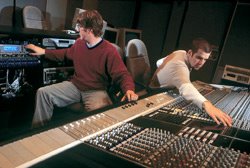All Amplification Distorts
 When Thailand’s Cultural Centre in Bangkok opened its doors to musicians, orchestras, opera, and ballet companies the management deployed their multi microphone and amplifying system expecting that the same musical rules would be followed as in a wat fair. Whether it was at the protest of the performers, the audience, or perhaps some knowledgeable person among them, they soon learned that there is music that is not to be amplified. It seems that even in great music centres of the world the lesson is being forgotten and there is a tendency to amplify, to “correct” the acoustics of performance halls.
When Thailand’s Cultural Centre in Bangkok opened its doors to musicians, orchestras, opera, and ballet companies the management deployed their multi microphone and amplifying system expecting that the same musical rules would be followed as in a wat fair. Whether it was at the protest of the performers, the audience, or perhaps some knowledgeable person among them, they soon learned that there is music that is not to be amplified. It seems that even in great music centres of the world the lesson is being forgotten and there is a tendency to amplify, to “correct” the acoustics of performance halls.The year began with an article by a music critic of the New York Times pointing out that no amplification system, however modern, advanced, or complex can enhance the singing voice of a great artist or the sound of a great musical instrument. But the writer goes on to reflect that there is a greater danger yet; young people are growing up whose hearing is permanently damaged by hours, days, and years of exposure to overloud personal music players so that a generation is no longer capable of hearing the perfection of music without amplification:
Referring to a Newsweek cover story last summer by David Noonan,
"...baby boomers who exposed themselves to blasting rock bands are now suffering the consequences. More than 28 million Americans, many in this age group, have a significant degree of hearing loss, and the number is expected to swell to 78 million by 2030. Mr. Noonan reported that more than 5 million children and teenagers between 6 and 19 have some hearing damage from amplified music and the general noise they encounter every day, a good deal of it funneled directly into their ears. 'If they don't take steps to protect their hearing,' he wrote, 'the iPod generation faces the same fate as the Woodstock generation. Or worse.'"
What tragedy.


0 Comments:
Post a Comment
<< Home